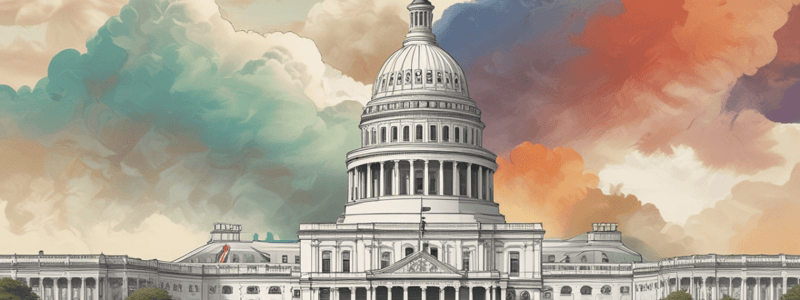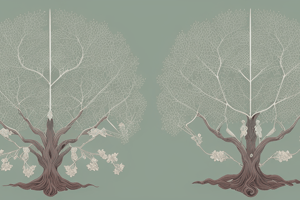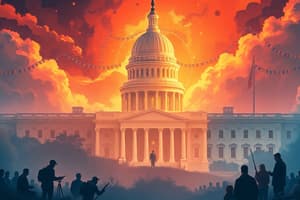Podcast
Questions and Answers
What is the primary function of a government?
What is the primary function of a government?
- To provide economic benefits to its citizens
- To maintain a strong military presence
- To protect individual rights and freedoms (correct)
- To impose strict laws and regulations
Which characteristic is NOT typically associated with a democracy?
Which characteristic is NOT typically associated with a democracy?
- Active participation of citizens
- Absolute power of the ruler (correct)
- Protection of individual rights
- Free and fair elections
What is the main difference between authoritarianism and totalitarianism?
What is the main difference between authoritarianism and totalitarianism?
- Presence of a single-party system
- Extent of government control over citizens' daily lives (correct)
- Role of the military in government
- Level of government control over the economy
What is the primary purpose of legislative committees?
What is the primary purpose of legislative committees?
What is the key difference between Congress and Parliament?
What is the key difference between Congress and Parliament?
Which of the following is a characteristic of an autocratic government?
Which of the following is a characteristic of an autocratic government?
What is the primary role of a transitional government?
What is the primary role of a transitional government?
Which of the following is a key function of legislatures?
Which of the following is a key function of legislatures?
What is a key difference between a democracy and an authoritarian regime?
What is a key difference between a democracy and an authoritarian regime?
What is the primary purpose of legislative committees?
What is the primary purpose of legislative committees?
What is the primary goal of a democratic government?
What is the primary goal of a democratic government?
What is a key characteristic of an authoritarian government?
What is a key characteristic of an authoritarian government?
What is the primary function of a legislature?
What is the primary function of a legislature?
What is a key difference between a democracy and a totalitarian regime?
What is a key difference between a democracy and a totalitarian regime?
What is the purpose of legislative committees?
What is the purpose of legislative committees?
What is a key characteristic of a democratic system of government?
What is a key characteristic of a democratic system of government?
What is the primary role of a legislature in a democratic system?
What is the primary role of a legislature in a democratic system?
What is the primary difference between Congress and Parliament?
What is the primary difference between Congress and Parliament?
What is the purpose of legislative committees?
What is the purpose of legislative committees?
Flashcards are hidden until you start studying
Study Notes
Forms of Government
- The role of government is to provide services, maintain order, and protect citizens' rights and freedoms.
- The functions of government include lawmaking, policy implementation, and provision of public goods and services.
Characteristics of a Democracy
- A democracy is a system of government where power is held by the people, either directly or through elected representatives.
- Characteristics of democracy include free and fair elections, active participation of citizens, protection of individual rights and freedoms, and the rule of law.
Autocratic Systems
- Autocracy is a system of government where power is held by one person or a small group of people.
- Totalitarianism is an autocratic system where the government exerts total control over all aspects of citizens' lives.
- Authoritarianism is a system where the government has complete control, but may allow some individual freedoms.
Transitional Governments
- A transitional government is a temporary system of government established to manage the transition from one political system to another.
- Transitional governments are often formed during times of political unrest, conflict, or revolution.
Legislatures
- The powers of legislatures include lawmaking, budgeting, and oversight of the executive branch.
- The functions of legislatures include representation of citizens, deliberation, and decision-making.
Comparing Congress and Parliament
- Congress is a bicameral legislature, consisting of the House of Representatives and the Senate.
- Parliament is a unicameral or bicameral legislature, typically consisting of the House of Commons and the Senate.
- The key difference between Congress and Parliament is the system of government, with Congress being part of a presidential system and Parliament being part of a parliamentary system.
Legislative Committees
- The purpose of legislative committees is to conduct research, hold hearings, and draft laws.
- Committees allow for more efficient and effective lawmaking, as well as increased oversight of the executive branch.
Forms of Government
- The role of government is to provide services, maintain order, and protect citizens' rights and freedoms.
- The functions of government include lawmaking, policy implementation, and provision of public goods and services.
Characteristics of a Democracy
- A democracy is a system of government where power is held by the people, either directly or through elected representatives.
- Characteristics of democracy include free and fair elections, active participation of citizens, protection of individual rights and freedoms, and the rule of law.
Autocratic Systems
- Autocracy is a system of government where power is held by one person or a small group of people.
- Totalitarianism is an autocratic system where the government exerts total control over all aspects of citizens' lives.
- Authoritarianism is a system where the government has complete control, but may allow some individual freedoms.
Transitional Governments
- A transitional government is a temporary system of government established to manage the transition from one political system to another.
- Transitional governments are often formed during times of political unrest, conflict, or revolution.
Legislatures
- The powers of legislatures include lawmaking, budgeting, and oversight of the executive branch.
- The functions of legislatures include representation of citizens, deliberation, and decision-making.
Comparing Congress and Parliament
- Congress is a bicameral legislature, consisting of the House of Representatives and the Senate.
- Parliament is a unicameral or bicameral legislature, typically consisting of the House of Commons and the Senate.
- The key difference between Congress and Parliament is the system of government, with Congress being part of a presidential system and Parliament being part of a parliamentary system.
Legislative Committees
- The purpose of legislative committees is to conduct research, hold hearings, and draft laws.
- Committees allow for more efficient and effective lawmaking, as well as increased oversight of the executive branch.
Forms of Government
- The role of government is to provide services, maintain order, and protect citizens' rights and freedoms.
- The functions of government include lawmaking, policy implementation, and provision of public goods and services.
Characteristics of a Democracy
- A democracy is a system of government where power is held by the people, either directly or through elected representatives.
- Characteristics of democracy include free and fair elections, active participation of citizens, protection of individual rights and freedoms, and the rule of law.
Autocratic Systems
- Autocracy is a system of government where power is held by one person or a small group of people.
- Totalitarianism is an autocratic system where the government exerts total control over all aspects of citizens' lives.
- Authoritarianism is a system where the government has complete control, but may allow some individual freedoms.
Transitional Governments
- A transitional government is a temporary system of government established to manage the transition from one political system to another.
- Transitional governments are often formed during times of political unrest, conflict, or revolution.
Legislatures
- The powers of legislatures include lawmaking, budgeting, and oversight of the executive branch.
- The functions of legislatures include representation of citizens, deliberation, and decision-making.
Comparing Congress and Parliament
- Congress is a bicameral legislature, consisting of the House of Representatives and the Senate.
- Parliament is a unicameral or bicameral legislature, typically consisting of the House of Commons and the Senate.
- The key difference between Congress and Parliament is the system of government, with Congress being part of a presidential system and Parliament being part of a parliamentary system.
Legislative Committees
- The purpose of legislative committees is to conduct research, hold hearings, and draft laws.
- Committees allow for more efficient and effective lawmaking, as well as increased oversight of the executive branch.
Forms of Government
- The role of government is to provide services, maintain order, and protect citizens' rights and freedoms.
- The functions of government include lawmaking, policy implementation, and provision of public goods and services.
Characteristics of a Democracy
- A democracy is a system of government where power is held by the people, either directly or through elected representatives.
- Characteristics of democracy include free and fair elections, active participation of citizens, protection of individual rights and freedoms, and the rule of law.
Autocratic Systems
- Autocracy is a system of government where power is held by one person or a small group of people.
- Totalitarianism is an autocratic system where the government exerts total control over all aspects of citizens' lives.
- Authoritarianism is a system where the government has complete control, but may allow some individual freedoms.
Transitional Governments
- A transitional government is a temporary system of government established to manage the transition from one political system to another.
- Transitional governments are often formed during times of political unrest, conflict, or revolution.
Legislatures
- The powers of legislatures include lawmaking, budgeting, and oversight of the executive branch.
- The functions of legislatures include representation of citizens, deliberation, and decision-making.
Comparing Congress and Parliament
- Congress is a bicameral legislature, consisting of the House of Representatives and the Senate.
- Parliament is a unicameral or bicameral legislature, typically consisting of the House of Commons and the Senate.
- The key difference between Congress and Parliament is the system of government, with Congress being part of a presidential system and Parliament being part of a parliamentary system.
Legislative Committees
- The purpose of legislative committees is to conduct research, hold hearings, and draft laws.
- Committees allow for more efficient and effective lawmaking, as well as increased oversight of the executive branch.
Studying That Suits You
Use AI to generate personalized quizzes and flashcards to suit your learning preferences.




